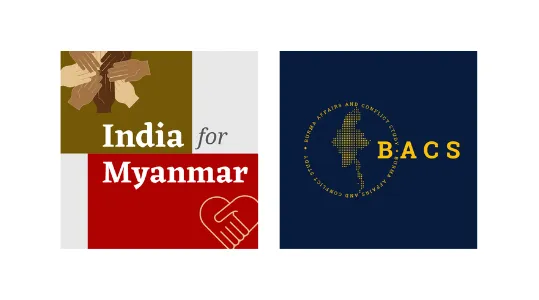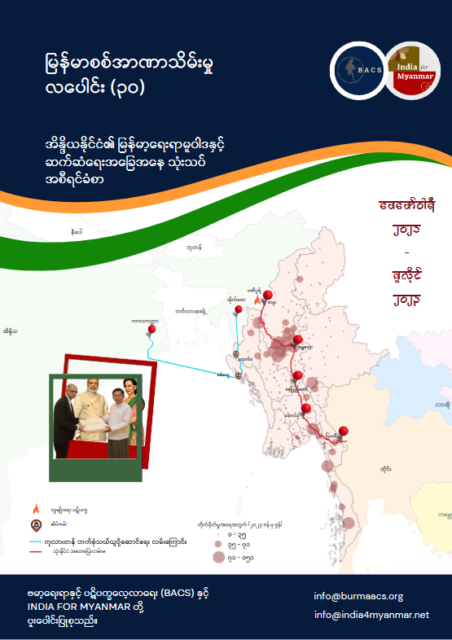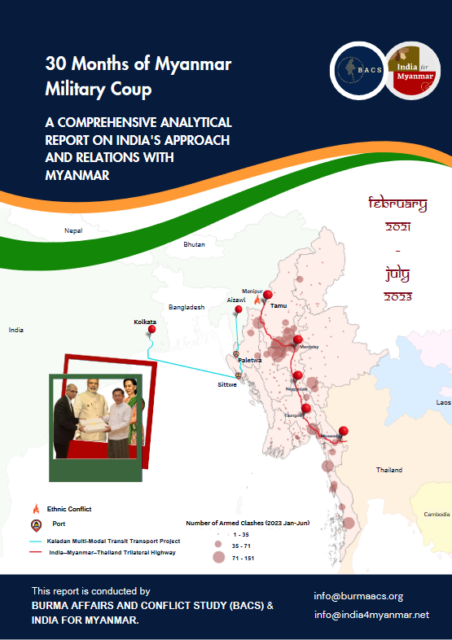30 Months of Myanmar Military Coup – A Comprehensive Analytical Report on India’s Approach and Relations with Myanmar
05 September 2023



On February 1, 2021, the Myanmar military overturned the 2008 Constitution, which was drawn up on their own accord without the will of the people, and forcibly and unlawfully seized control from the elected government. In the span of 30 months since the coup, the aggressive Myanmar military has apprehended and incarcerated over 24,462 citizens, including prominent figures such as public leader Daw Aung San Suu Kyi and Myanmar’s elected President U Win Myint. Among the detained were more than 653 children and over 4,897 women, while the number of individuals sentenced to death reached 101. In addition, the ruthless Myanmar military has been responsible for the deaths of more than 4,007 innocent individuals, including over 446 children, within the 30-month timeframe. Disturbingly, more than 74,874 structures, encompassing religious edifices and houses, have been subjected to arson, with a significant portion of these acts occurring in Sagaing Division (57,503 buildings) and Chin State (1,637 buildings) along the Indian border. The terrorist Myanmar military has also employed rape as a weapon and subjected 117 women, including pregnant individuals, to sexual violence. Due to the people’s complete rejection of the Myanmar military’s coup and their implementation of violence in various forms to retain power, over 1.1 million civilians have been compelled to flee the country. Hundreds of thousands have sought refuge in neighbouring countries, with an estimated 50,000 seeking safety in India. As a consequence of the coup in Myanmar, more than 40 percent of the population has plunged below the poverty line. Many young civilians, unwilling to succumb to the brutality of the Myanmar military, have taken up arms and are resisting their oppressive rule. This armed resistance has contributed to the intensification of the conflict within Myanmar. The ongoing struggle for freedom, coupled with armed conflicts and political strife, has not only affected the nation itself but has also caused repercussions on the economic, social, and regional security of neighbouring countries.
As a collaborative effort from BACS and India for Myanmar, this report delineates the relationship between India and the military council from February 2021 to July 2023. The report delves into India’s strategic economic and diplomatic stance, shedding light on its support for the Military Council. Furthermore, it scrutinises how India’s approach towards Myanmar has detrimentally impacted the country’s democracy movement and, by extension, regional security and India’s own security and interests. The report concludes with a recommendation that India should align with the aspirations of the people of Myanmar rather than blatantly disregarding them.
The world’s influential nations and major international organisations, including the United Nations, rejected the unlawful takeover by the terrorist military group. The Military Council remains unrecognised and is isolated from global and regional diplomatic and political interactions. International countries have also imposed sanctions on the terrorist military group concerning their financial and political activities. Nevertheless, certain nations maintain relations with the Military Council due to their own interests, and they engage in diplomatic and business sectors. One of these nations is India, recognised as the world’s largest democracy. Myanmar and India, neighbouring countries sharing an extensive border, must collaborate on various fronts such as political, economic, trade, investment, border management, security concerns, and regional diplomatic and political dynamics.
Armed conflict in Myanmar is intensifying as armed resistance opposes the military council. Additionally, the crisis in Myanmar has created difficult circumstances along India’s northeastern border. The continuous armed conflict has led to a substantial influx of refugees from Chin State and Sagaing into the northeastern region of India, resulting in complex humanitarian challenges. Striking a balance between broader geopolitical interests and pressing humanitarian concerns demands a level of meticulous attention unprecedented in India’s history. The unexpected military coup in Myanmar has intricately complicated the trajectory of India-Myanmar relations, introducing new challenges that necessitate diplomatic resolutions.
The unlawful coup orchestrated by the terrorist Myanmar military group transcends a mere domestic political conflict; it represents a clash between democracy and dictatorship within the global political arena. The repercussions of the Myanmar coup have posed a significant test for India. The resultant political instability in Myanmar has given rise to economic and regional stability concerns that directly impact India’s interests in the Mekong region.
This report comprehensively covers the multifaceted transformations that have unfolded following the coup, shedding light on the setbacks and their ramifications on the bilateral ties between the two nations. Both India and the Military Council that emerged from the coup have exercised caution in terms of involvement and interaction in the post-coup scenario. This cautious approach is guided by a shared vision for regional stability, considering their intertwined histories and strategic interests. Consequently, this report meticulously examines and analyses the dynamic patterns that have shaped the trajectory of India-Myanmar relations during this pivotal period of change. It provides an in-depth exploration of overarching events, diplomatic strategies, economic implications, and regional effects. Through the collaborative efforts of BACS and I4M, we underscore the intricate interplay between these two countries and offer insights into the prospective course of their relationship. The report is presented as an equitable assessment, with the aim of providing foresight and understanding.
Announcements
21 May 2025
Open letter: Malaysia must lead ASEAN with principle, not hypocrisy, to address the Myanmar crisis

Progressive Voice is a participatory rights-based policy research and advocacy organization rooted in civil society, that maintains strong networks and relationships with grassroots organizations and community-based organizations throughout Myanmar. It acts as a bridge to the international community and international policymakers by amplifying voices from the ground, and advocating for a rights-based policy narrative.